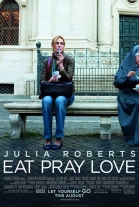Eat Pray Love
|  The producers of Eat Pray Love, which stars Julia Roberts and is based on a best-selling memoir by Elizabeth Gilbert, are likely hoping that their film will be seen as an “adult” alternative to all the juvenile nonsense of the summer movie season. A continent-hopping drama about a woman’s yearlong search for meaning in her life, it has all the requisite ingredients of something “important” by Hollywood’s standards: good intentions sourced from a pre-sold property, first-rate production values, and a top-tier movie star to anchor the audience amid all the soul-searching and globe-trotting. The irony is that Eat Pray Love is just as shallow and self-serving as all the testosterone-packed idiocy of the typical Hollywood summer blockbusters; the only difference is its façade of intellectual, spiritual, and dramatic seriousness. At least The A-Team made no bones about its spiritual bankruptcy. The producers of Eat Pray Love, which stars Julia Roberts and is based on a best-selling memoir by Elizabeth Gilbert, are likely hoping that their film will be seen as an “adult” alternative to all the juvenile nonsense of the summer movie season. A continent-hopping drama about a woman’s yearlong search for meaning in her life, it has all the requisite ingredients of something “important” by Hollywood’s standards: good intentions sourced from a pre-sold property, first-rate production values, and a top-tier movie star to anchor the audience amid all the soul-searching and globe-trotting. The irony is that Eat Pray Love is just as shallow and self-serving as all the testosterone-packed idiocy of the typical Hollywood summer blockbusters; the only difference is its façade of intellectual, spiritual, and dramatic seriousness. At least The A-Team made no bones about its spiritual bankruptcy.Roberts stars as Liz Gilbert, the screen surrogate of the real-life free-lance magazine writer and novelist Elizabeth Gilbert who, in her 2006 memoir of the same title (unread by me), chronicled her trip to Italy, India, and Bali in search of … well, something. When the film opens, Liz is a successful magazine travel writer who is married to a good-hearted, but flaky guy named Stephen (Billy Crudup) who never seems to know what he really wants to do. Liz feels stranded in her life, and after a heartfelt prayer to God on the bathroom floor, decides to end her marriage. She briefly takes up with an actor named David (James Franco) who is playing the lead role in a play she penned that is apparently about her own marital problems, and although the relationship ultimately crashes and burns, David introduces her to ideas about New Age mysticism that she can’t quite shake. So, what’s a wealthy, successful Manhattanite to do but store all her belongings and take off on a cross-continental soul-searching journey of gastronomic gluttony, ascetic living, and meet-cute romanticism? That is precisely what Liz does, and Eat Pray Love’s remaining two hours are split fairly evenly between her time in Italy, where she indulges in good food, wine, and conversation with a group of attractive (or at least eclectic) Europeans; India, where she joins an ashram and tries to learn the arts of meditation and self-sacrifice; and ultimately Bali, where she submits herself to the tutelage of a cutesy-old medicine man who predicted more than a year earlier that her marriage would end, she would lose all her money, and would come back to him to learn. In Bali she also finds love again, this time with Javier Bardem’s hunky Brazilian divorcee Felipe, who is still nursing his own romantic wounds after more than a decade. The balance of these apparently competing ways of life--sensual gratification, spiritual dedication, and romantic fulfillment--are supposed to give the story some kind of sacred balance that we should all take to heart, but it’s hard not to feel that the whole endeavor is just a glorified exercise in having your cake and eating it too. Eat Pray Love is little more than a self-indulgent wallow in white upper-class privilege feigning depth by cloaking itself in fortune cookie wisdom. At no point is Liz’s ability to leave her life behind and travel the world for a year presented as anything other than a simple opportunity that is ostensibly open to anyone. Even if the film’s ideological intentions are pure, it immediately wrecks on the rocky shoals of Liz’s unstated socioeconomic advantage, which allows her to experience Italy’s best cafes and wile away her days in Bali in a seaside cottage. Its embrace of abject narcissism as personal growth is all the more grating given that it is premised on one’s ability to indulge in the kind of pampered world travel that is out of the reach of all but the upper one percent. It doesn’t help that Julia Roberts is movie-star radiant throughout the film; even when she’s scrubbing floors in an Indian ashram, she looks like she just stepped from the set of a shampoo commercial. At no point do we sense in her the physical and emotional wear and tear of travel and isolation from one’s native culture; the whole film could be a travel agency commercial. Even more insulting is a sequence in which she implores to a friend in Italy to let herself go and dig into the country’s fattening buffet of pasta and pizza without concern for weight gain when Roberts never looks for a moment like she wears anything above a size 0. If we’re going to be lectured about being above body-image issues, the least Roberts could have done was take a De Niro-esque vow of Method commitment and gain 20 pounds. Granted, the film does have its charms and its moments of dramatic heft. The depiction of Liz’s misguided desperation in dating David following her divorce will ring true with anyone who has ever felt suddenly cut adrift from a long-term commitment. The film also benefits significantly from the presence of Richard Jenkins as “Richard From Texas,” a disarmingly direct American who is also studying at the ashram where Liz seeks spiritual enlightenment. With his grizzly beard and ’50s glasses, Jenkins captures the essence of a man in search of something, although his primary role is to call Liz to the carpet for her frequently facile intentions, something the film as a whole never quite reconciles. Roberts’ performance is genuinely good throughout, although it’s hard not to feel frustrated with how wasted it is on the shallow material. Her prayer on the bathroom floor near the beginning of the film is particularly powerful, although the film doesn’t have the guts to follow through with anything even remotely genuine regarding her spiritual development. Rather, Liz grows via a series of grab-bag spiritual moments that add up to nothing of any real substance. It is the film’s supreme irony that Liz accuses Richard of speaking in bumper stickers, because the film itself rarely rises above such simplistic, easily digestible, but ultimately meaningless rhetoric. Copyright ©2010 James Kendrick Thoughts? E-mail James Kendrick All images copyright © Columbia Pictures |
Overall Rating: 
 (1.5)
(1.5)


